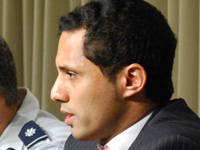Registration
You will receive an email confirming your registration.
IMGXYZ1226IMGZYXAs counterterrorism policies move away from purely military solutions, policy makers are taking a closer look at counter-radicalization and disengagement programs for violent extremists in the Arab world. North African countries including Egypt, Algeria, and Libya have begun these programs and processes with interesting results. Omar Ashour, lecturer in Politics at the Institute of Arab and Islamic Studies in the University of Exeter discussed the findings of his field research on de-radicalization at Carnegie:
- De-radicalization is a process of working to combat extremism in groups or individuals that have already committed violence. There are three dimensions to the de-radicalization programs prevalent in North Africa:
- Behavioral – require the abandonment of violence
- Ideological – de-legitimize the use of violence
- Organizational – structural changes within an organization’s leaderships.
- De-radicalization of extremist groups does not always occur in those three areas. For example, the Libyan Islamic Fighting Group (LIFG) was de-radicalized by altering its ideology and behavior, whereas the Islamic Salvation Army (AIS) in Algeria only de-radicalized for pragmatic reasons and did not change its ideological view on the use of violence. The Islamic Group of Egypt was successfully de-radicalized after changing all three elements.
- The success of any de-radicalization process in North Africa depends heavily on three factors:
- The dynamics between the spiritual and organizational leadership within a group
- The group’s interaction with the society
- The domestic political circumstances of the country in which the group operates
- Experience shows that increased state repression drives groups to become more radicalized. However, in some cases heavy state repression can do the opposite and lead groups to give up violence against the state, most notably in the case of Egypt’s Islamic Group.
In the questions and answers session Ashour discussed the role prison conditions play in helping to further radicalize individuals opposed to the state. While third parties like local clerics and Sheikhs are useful for supporting a de-radicalization process and maintaining its success, de-radicalization is most effective when it starts within the extremist organization.
